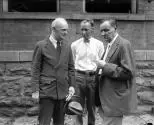Back to the Big Apple

I made my first trip to New York City in 1978, when I was researching an obscure New York politician and defense attorney by the name of Dudley Field Malone (1882-1950) (man on the left). Researching back in 1978, of course, meant spending hours in the New York Public Library and doing family interviews armed with just a yellow notepad and a Bic pen.
Dudley Field Malone was a fascinating footnote in early 20th century politics. In 1912 he helped Woodrow Wilson become president, and was rewarded with a plum political position: Customs Collector for the Port of New York. Malone signed off on the controversial manifest for the ill-fated Lusitania, which sailed out of New York harbor one last time on May 1, 1915. Malone soon rose to become assistant Secretary of State, then married Doris Stevens, a suffragette who was once arrested for chaining herself to the White House fence. After President Wilson backed away from his campaign promise to support the suffragettes, Malone resigned his office in protest, sacrificing a promising political career.
Malone later volunteered to assist Clarence Darrow in the defense of John Scopes, the twenty-four-year-old Tennessee biology teacher who in 1925 served as the test case in an effort to repeal that state’s ban on the teaching of evolution (top photo). As fascinating as Dudley Field Malone was, I was unable to finish the book, as the one key piece in his puzzle — the manuscript of his lengthy, hand-written autobiography — disappeared after Malone died, destitute and forgotten, in 1950.
Last Wednesday’s trip back to New York was brief and unexpected, so I did not have time to make any advance plans. Besides, it was the first dry, warm, sunny day of the week, so on a lark I decided to do something I had never done before: I jumped on an open-air, double-deck tour bus and took a leisurely lap around the island.
Corny? Of course.

But it was entertaining, and I disembarked with all sorts of important information, like how there are just twelve gas stations in all of Manhattan, and the average monthly rent for a one-bedroom apartment has now climbed to $3,900.
But imagine my surprise when our tour bus rounded the corner of 8th Avenue and West 34th Street near Madison Square Garden, and came face-to-face with the freshly-painted side of a twenty-story building bearing a gigantic advertisement for a new Cadillac, featuring this quote as the slogan over the car:
“It is the weak man who urges compromise.” — Elbert Hubbard
At first, I didn’t know what to think. I wasn’t offended that Cadillac was using Elbert Hubbard to sell cars, for the fortune Elbert Hubbard made before founding the Roycroft Campus came from his time as the Larkin Soap Company’s director of marketing. Even as a Roycrofter, Hubbard appeared in a men’s clothing ad wearing a new suit he had been asked to endorse.
I certainly was pleased to see that the Cadillac people did credit Elbert Hubbard for his quote, although I would be curious to know just what percentage of people strolling along 8th Avenue actually looked up and knew who Elbert Hubbard was.
But at least they might then ask . . . .
I’m sure the quote originally had some context other than manufacturing luxury cars, and I’m equally as sure the famed Roycrofter had made a few compromises of his own during his stormy and controversial career — but I’m also sure that Elbert Hubbard would still stand by those words.
At least in theory.

Until next Monday,
“I have never learned anything from any man who agreed with me.” — Dudley Field Malone
Bruce
Top: Dudley Field Malone, John Scopes, and Clarence Darrow in Dayton, TN during the Scopes Monkey Trial. Photo courtesy of the Chicago Tribune.
Middle: The Cadillac ad with the Elbert Hubbard quotation in New York City.
Have your favorite quote – by Elbert Hubbard or anybody else? I posted mine over at our Facebook page, so check it out, let me know what you think, and hopefully add yours!
